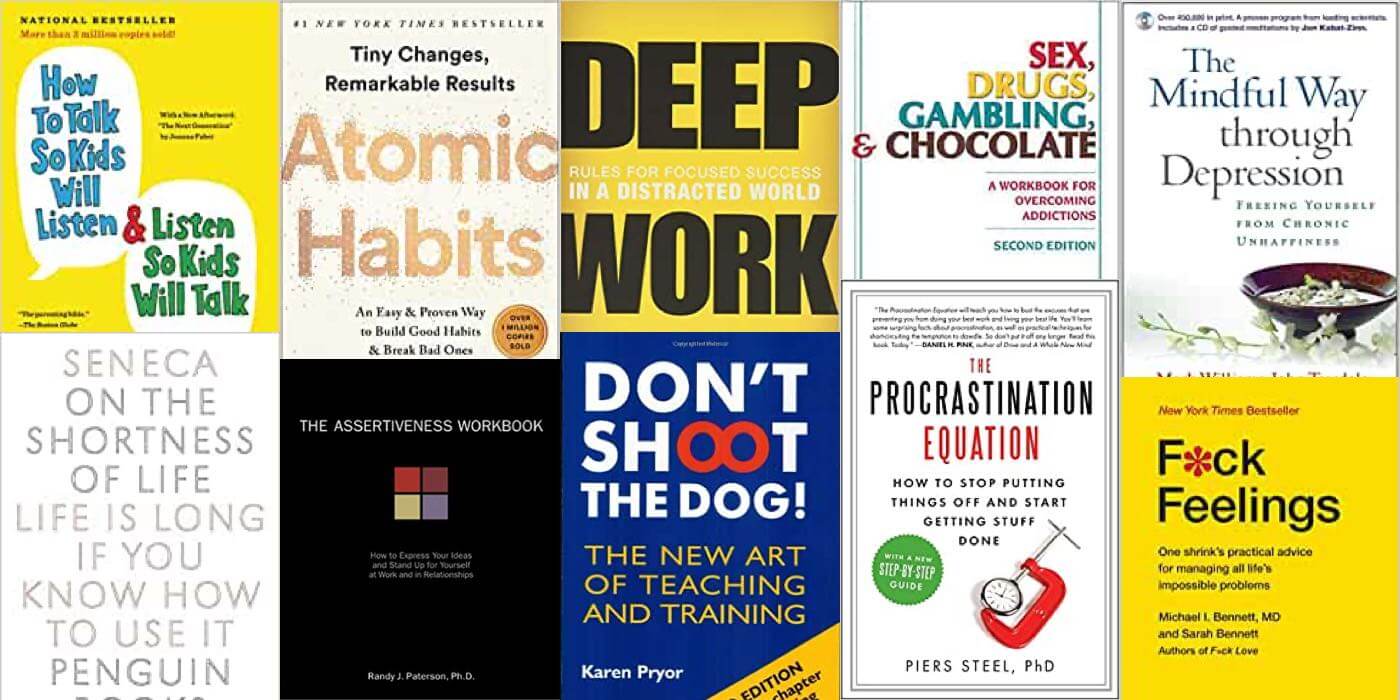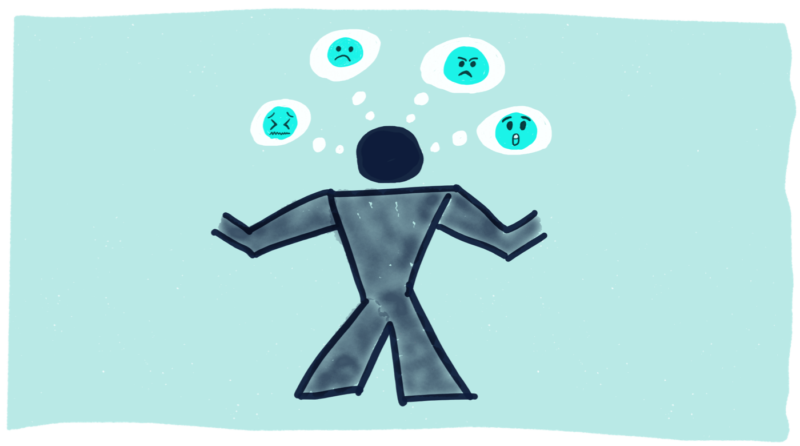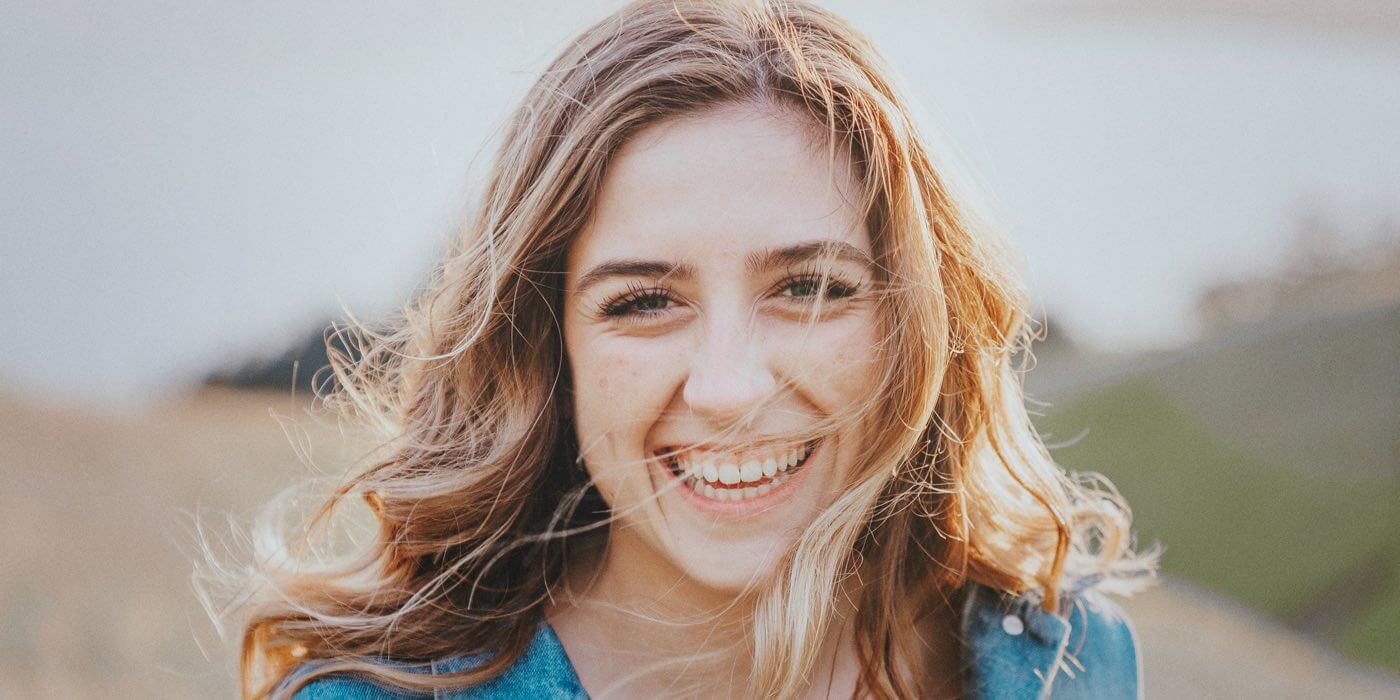The term self-help has very nearly become a parody of itself.
In casual conversation, it gets used ironically more often than in earnest. And while much of the criticism of self-help is deserved—there are a lot of bad self-help books out there!—I must admit, I still love it.
Not only do I read a lot of self-help myself, but it’s literally what I do for a living: As both a psychologist and writer, helping other people to help themselves is exactly what I try to do.
So, without an ounce of irony, here’s a list of 10 self-help books that I’ve found genuinely helpful. I’ve read most of them more than once and each time I learn something new and helpful.
1. Deep Work
The term masterpiece probably gets thrown around far too often, but I really think Cal Newport’s manifesto on the true meaning of work and productivity in the 21st century will go down in history as one. People often ask me how I write and produce so many articles, podcasts, courses, etc. while working a full-time job and raising a young family… This book is a big part of the answer. If you can really commit to the ideas and practices in this book, you will be astonished at what you’re capable of creating.
2. Atomic Habits
If habit change is something you want to work on, make this book your Bible. Full of straightforward ideas and tactics for building new habits or breaking bad ones, James Clear’s book is really more of a field guide than a traditional non-fiction book—meaning it’s packed with useful, straightforward information and very little fluff or filler. If you want to learn a little more about the book, I did a quick summary and quote review here.
3. The Assertiveness Workbook
I’ve said it many times, but assertiveness is probably the most underrated skill for better emotional health. If you struggle with communicating your own wants clearly and confidently, have a hard time setting (or enforcing) healthy boundaries, or just want to get better at communicating and being yourself around difficult people, this book is for you. Written by Randy Paterson, a psychologist and assertiveness expert, this really is a workbook in the sense that it’s loaded up with practical exercises and techniques you can start using in your life right away. If you’re interested in assertiveness and want a good introduction to the topic, I interviewed Randy about it in this episode of my podcast.
4. The Mindful Way Through Depression
While it’s about overcoming depression specifically, the core idea of this book is universally helpful for any form of emotional suffering. In short, feeling bad isn’t the problem; it’s feeling bad about feeling bad and that leads to long-term suffering. This is one of the few books about psychology that has transformed the way I practice and how I think about emotional suffering and personal growth. You can get a peek inside the book and some of my favorite ideas from it in this brief quote review I did.
5. Sex, Drugs, Gambling, & Chocolate
Addiction is an especially difficult topic because people have so many strong beliefs about what it is and how it ought to be addressed. Tom Horvath’s workbook truly is a breath of fresh air when it comes to thinking about addiction in a straightforward way and how to go about actually dealing with any form of addiction (or that of someone you love). If you want to get a sense for how Tom thinks about addiction, you can listen to an interview I did with him for an episode of my podcast here.
6. How to Talk So Kids Will Listen & Listen So Kids Will Talk
I’ve read A LOT of books about effective communication and relationships, and to this day, the best one I’ve ever found is disguised as a parenting book. Even though it’s written from the perspective of parents talking to kids, the principles Faber and Mazlish lay out in this book are just as useful for adults communicating with other adults. And I suspect because the primary audience is children, the ideas are even more clearly explained and illustrated. Whether you have kids or not, this book will drastically improve your communication skills, and as a result, your relationships.
7. Don’t Shoot the Dog
Don’t let the eccentric title put you off… World-renown animal trainer Karen Pryor’s book is a crash course in the core principles of behavioral psychology and how to use them to improve your life. I found many of the principles in here to be especially useful at encouraging other people in your life to make changes that they’re initially resistant to.
8. The Procrastination Equation
The author of the book, Piers Steel, is probably the world’s foremost researcher and expert on the psychology of procrastination. The key idea in the book is that there are four primary reasons why we procrastinate. And the secret to effectively managing your own procrastination is to figure out which one(s) are at play in the specifics of your situation and address those in a targeted way. If you want to learn more, I interviewed Piers for my podcast in this episode.
9. F*ck Feelings
Written by father-daughter duo Michael and Sarah Bennett—the former is a psychiatrist, the latter a comedian—this book’s central message is arguably the most important idea about mental health most people never hear: Feeling better emotionally should never guide your decision-making—and in fact, it’s a recipe for suffering in the long run. I wrote up a brief quote review here if you want to learn a little more.
10. On the Shortness of Life
I read this book every year in early January because it reminds me that life is short and motivates me to make the most of it. I know that sounds a little corny, but it’s true. Written 2,000+ years ago by the Stoic philosopher Seneca, this very short book forces you to confront your own mortality as a way to revitalize your goals and aspirations for what Mary Oliver called “your one wild and precious life.” You can learn more about the book and see some of my favorite quotes from it in this short review I did.
Your Turn…
Like I said, I’m a bit of a self-help junky, so I’m always on the look-out for new recommendations.
I’d love to hear what some of your favorite self-help books are. Just reply in the comments below ↓





46 Comments
Add YoursThe books that have been my ‘go to’ self help books for many years in order of importance and timelessness:
1. A Strategy for Daily Living, Ari Kiev MD
2. The Road Less Travelled, M. Scott Peck
3. The Spirituality of Imperfection
Kurz and Ketchum
4. Start with Why, Simon Sinek
Nice list, Ben! I haven’t read the first three, but Start with Why is great. Thanks!
Brene Brown „The gifts of Imperfection“,
Aron Elain „The highly Sensitive Person“,
Ken Robinson „Finding Your Element“, and last but by no means least: „How to talk so Kids Will Listen & Listen so Kids Will talk“ was really important for me
I just finished “The Gifts of Imperfection.” It’s a great book!
Good ones, thanks Linda!
Great list! There’s a few on here that just got added to my “to read” list. Thank you! Here’s a short list from me:
1. “The Road Less traveled” by M. Scott Peck
2. “Changes that Heal” by Henry Cloud
3. “The Wisdom of the Body” by Christine Valters Paintner
4. “The 7 Habits of Highly Effective People” by Stephen R. Covey
5. “Rising Strong” by Brene Brown
Thanks, Allie. Haven’t heard of Road Less Traveled… I’ll check it out!
It’s a classic by M. Scott Peck, 1978. In a way the forerunner of all the others. Check it out and let us know what you think!
I love Handbook to Higher Consciousness
Wonderful list and follow-up suggetions. Thank you for such a gift!
Of course 🙂
Hi,
What’s your take on the following:
The Chimp Paradox
The Subtle Art of Not Giving Fuck
The Power of Now
?
Hey Chico,
Haven’t read the Chimp Paradox. I like the other two fine, although for whatever reason neither really resonated with me. I think they’re both good, for sure, just not quite my style.
I found the Power of Now a little too spiritual almost and got very bored very quickly, it’s quite repetative without really giving advice, so to speak.
Yeah, I don’t mind the spiritual side so much but my repetition tolerance in books is extremely low ????
Most non-fiction books are 300 pages and could easily be <100
Yes! Repetitive books make me feel like my intelligence is in question.
Great list, 2 of my all time favorites are on there:
“How to Talk to Your Kids” and
“Don’t Shoot the Dog.”
I would add
” The Road Less Traveled” – one of those pivotal books you can read every year.
“Essentialism” helped me filter my priorities and reshape my business for my own emotional well being.
Nick,
I find your advice makes sense and is easy to follow, so I was thrilled but not surprised to see “How to Talk” on your list. Almost 40 years ago, determined to parent better, I went in search of a book and finding this one changed everything. I have given this book to all new parents for decades. And, as you say, it also turned out to be useful in adult relationships. Can’t wait to try the others. I recommend The Untethered Soul by Mike Singer.
The Road Less Travelled changed my life in March, 1992. I learned what love really is. I have re-read it several times since then, and find something new each time I read it.
I liked The Power of Habit by Charles Duhigg.
Hey Nick,
Thanks for sharing this! Putting this all on my TBR.
Nick
If you read ‘A Strategy for Daily Living’ it’s all you need.
Ben May
I LOVE the book “Deep Work.” I’m glad that it made the top of the list. It’s no fluff unlike some other books but it actually provides practical knowledge for better focus and productivity.
I dunno—does Seneca really count as “self-help”? ???? If we’re including philosophy, then Marcus Aurelius’ Meditations and the Tao Te Ching.
The Celestine Prophecy by James Redfield
Curious: have you read “Letting go” by David R. Hawkins?
How about The Art of Possibility by Rosemund and Benjamin Zander. I’ve read it more than twenty times and get reinvigorated every time. It is a gift that keeps on giving.
Hello Nick. All great suggestions. I would love to send you a copy of my book Success Freak (which just received an award in the Career/Self-help category) if you are interested to read something new. Let me know where to send it if you are.
Hi, I love the list and all the comments. My favorites are Burnout to Breakthrough: Building Resilience to Refuel, Recharge, and Reclaim What Matters and The Elegant Warrior: How to Win Life’s Trials Without Losing Yourself.
Thanks for the curated book list – I’ll definitely get to some of them! Also really like the books recommended by your readers!
Some others I’ve found very helpful:
* Self-Compassion-The Proven Power of Being Kind to Yourself, Kristin Neff
* Wherever You Go There You Are, Jon Kabat-Zinn
* Changing for Good, James Prochaska et al
* Shed Your Stuff, Change Your Life, Julie Morgenstern
* Mindset, Carol Dweck
* Finish, Jon Acuff
And one little typo for you in the last book referenced, On the Shortness of Life. You have “You can learn habit more” and I think you mean “you can learn a bit more.” 🙂
Thanks again!
Thank you for these! Though people differ on what resonates for them, I usually try books recommended as “life changing.” I was told that about A New Earth by Eckhart Tolle (author of The Power of Now). Great book. It was life changing for me also (his message/technique). I recently heard from several people The Untethered Soul by Singer is “life changing”. Reading that now and will definitely get A road Less Traveled and How to Talk to Your Kids.
My most favourite out there is, “Reclaim your heart” by Yasmin Mogahed. Simply majestic ????
Anam Cara by John O Donahue a beautiful spiritual life guide beautifully written using very simple easy to understand language this book literally changed my life and l keep by my bedside table and randomly open a page when lm going through a difficult time and need a little support and guidance l would highly recommend this book you can buy it on Amazon for under£10 best wishes from Fiona Sweeney
The Empowered Wife by Laura Doyle
Though you’ve already said it didn’t resonate with you, Manson’s “subtle art…” changed my life. I actually find his blog a better resource. (Get that one weaves some posts together and voila, a book emerges.). He has an audiobook on audible titled “Love is not Enough” that I found really compelling.
I’m a middle aged woman – so Brene Brown is a given. Tatkin’s “Wired for Love” is a really approachable book that helped me practically apply attachment theory.
Definitely “how to talk” including the for Teens version, ‘Feel the Fear and do it anyway’ , along with everything else written by Susan Jeffers. The Highly Sensitive Person is fantastic, as is Quiet (about introverts). Quite good relationship books include Hold me Tight and How to improve your marriage without talking about it.
The Serenity Prayer
The Meaning of Life Victor Frankel
Did I miss a mention of “Feeling Good” by David Burns? That and “How To Stop Worrying and Start Living” by Dale Carnegie even though the dated style takes determination to get through!
Nick, I think that “I Don’t Want to Talk About It” by Terry Real, is a masterful summary of the challenges of Masculine conditioning. Appreciate your writing. Thank you and best wishes. Mikael
“Broken Open” by Elizabeth Lesser is one worth mentioning!
Psychocybernetics by Maxwell Maltz. Classic but still timely. IMHO, the granddaddy of them all.
Hi Nick, I read all types of memoirs. Some are those that are famous people I admire. I learn from everyone’s stories. The mistakes and successes in their lives and how they’ve managed both.
When I was young I had very little adult guidance. It was the biographies and memoirs that helped figure out how to be the best “human” I could be.
Example; when I was 13 yrs old I read Pearl Bailey’s bio, “The Raw Pearl”. She said, “you cannot belong to anyone else, until you belong to yourself”. Powerful words for a 13 yr old (I’m now 67).
“The Human Side of Human Beings”by Harvey Jackins
I love your recommendations! I would definitely suggest the “The Untethered Soul.” It was life changing for me and I have shared it with all my kids. “The truth is, everything will be okay as soon as you are okay with everything.” I have read it a few times, and am always getting new perspectives from each time I read it.
Exceptionally useful (to me) articles thank you
Chimp Paradox is good, but I like his later book — A Path Through The Jungle — much better as it provides deeper information.
Meanwhile, halfway through comedian Jimmy Carr’s book Before And Laughter and highly recommend it. He’s not simply funny, he’s also incredibly wise and insightful.